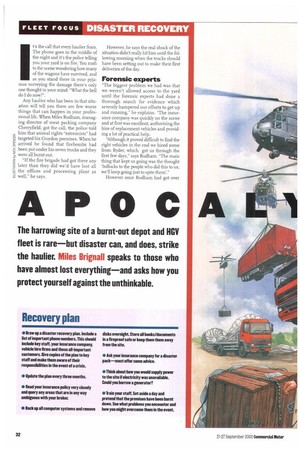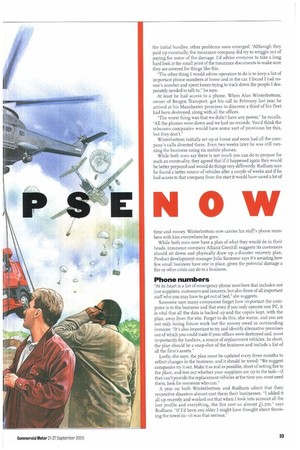APOC
Page 34

Page 35

If you've noticed an error in this article please click here to report it so we can fix it.
t's the call that every haulier fears. The phone goes in the middle of the night and its the police telling you your yard is on fire. You rush to the scene wondering how many of the wagons have survived, and as you stand there in your pyja mas surveying the damage there's only one thought in your mind: "What the hell do I do now?".
Any haulier who has been in that situation will tell you there are few worse things that can happen in your professional life. When Miles Rudham, managing director of meat packing company Cherryfield, got the call, the police told him that animal rights "extremists" had
gcc targeted his Croydon premises. When he
le arrived he found that firebombs had
6 been put under his seven trucks and they were all burnt out.
E If the fire brigade had got there any g later than they did we'd have lost all ▪ the offices and processing plant as ▪ well," he says. However, he says the real shock of the situation didn't really hit him until the following morning when the trucks should have been setting out to make their first deliveries of the day.
Forensic experts
"The biggest problem we had was that we weren't allowed access to the yard until the forensic experts had done a thorough search for evidence which severely hampered our efforts to get up and running," he explains. "The insurance company was quickly on the scene and at first was excellent, authorising the hire of replacement vehicles and providing a lot of practical help.
"Although it proved difficult to find the right vehicles in the end we hired some from Ryder, which got us through the first few days," says Rudham. "The main thing that kept us going was the thought 'bollocks to the people who did this to us, we'll keep going just to spite them'."
However once Rudham had got over the initial hurdles, other problems soon emerged: "Although they paid up eventually, the insurance company did try to wriggle out of paying for some of the damage. I'd advise everyone to take a long hard look at the small print of the insurance documents to make sure they are covered for things like this.
"The other thing I would advise operators to do is to keep a list of important phone numbers at home and in the car. I found I had noone's number and spent hours trying to track down the people I desperately needed to talk to," he says.
At least he had access to a phone. When Alan Winterbottom, owner of Bergen Transport, got his call in February last year he arrived at his Manchester premises to discover a third of his fleet had been destroyed, along with all the offices.
"The worst thing was that we didn't have any power," he recalls. "All the phones were down and we had no records. You'd think the telecoms companies would have some sort of provision for this, but they don't."
Winterbottom initially set up at home and soon had all the company's calls diverted there. Even two weeks later he was still running the business using six mobile phones.
While both men say there is not much you can do to prepare for such an eventuality, they agreed that if it happened again they would be better prepared and would do things very differently. Rudham says he found a better source of vehicles after a couple of weeks and if he had access to that company from the start it would have saved a lot of
time and money. Winterbottom now carries his staff's phone numbers with him everywhere he goes.
While both men now have a plan of what they would do in their heads, insurance company Allianz Cornhill suggests its customers should sit down and physically draw up a disaster recovery plan. Product development manager Julia Sansome says it's amazing how few small business have one in place, given the potential damage a fire or other crisis can do to a business.
Phone numbers
"At its heart is a list of emergency phone numbers that includes not just suppliers, customers and insurers, but also those of all important staff who you may have to get out of bed," she suggests.
Sansome says many companies forget how important the computer is to the business and that even if you only operate one PC, it is vital that all the data is backed up and the copies kept, with the plan, away from the site. Forget to do this, she warns, and you are not only losing future work but the money owed in outstanding invoices: "It's also important to try and identify alternative premises out of which you could trade if your offices were destroyed and, most importantly for hauliers, a source of replacement vehicles. In short, the plan should be a snap-shot of the business and include a list of all the firm's assets."
Lastly, she says, the plan must be updated every three months to reflect changes in the business, and it should be tested: "We suggest companies try it out. Make it as real as possible, short of setting fire to the place, and test out whether your suppliers are up to the task—if they can't provide the replacement vehicles at the time you most need them, look for someone who can."
A year on both Winterbottom and Rudham admit that their respective disasters almost cost them their businesses. "I added it all up recently and worked out that when I took into account all the lost profits and everything, the fire cost us almost £1.5m," says Rudham. "If I'd been any older I might have thought about throwing the towel in—it was that serious."












































































































